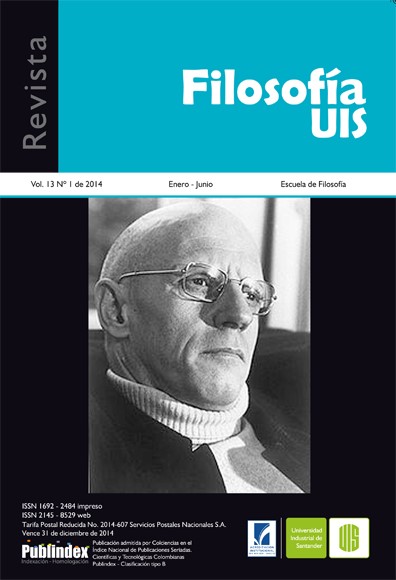Appearance and reality in neoclasical economics and Plato’s Hippias Major
Published 2014-04-29
Keywords
- Neoclassical economics,
- Plato,
- sophists,
- argumentation,
- irony
How to Cite
Copyright (c) 2014 Germán Ulises Bula Caraballo

This work is licensed under a Creative Commons Attribution 4.0 International License.
Abstract
The text, following Paul Krugman’s analysis, analizes the failures of the economic profession that led to the crisis of 2008 in terms of certain sophistic attitudes towards knowledge that are exemplified in Plato’s dialogues, specially Hippias Major. Krugman’s suggestion that economists confuse the beautiful with the true is analyzed, as well as the relationship between economic and cognitive bubbles, the procedure of both sophists and economists when faced with a reduction ad abusrdum, and the confusion between success and indicators of success. Finally, some suggestions for the economic profession are made in terms of socratic irony.
Downloads
References
- Aristófanes (2003). Las nubes. Lisistrata. Dinero. Madrid: Alianza.
- Bayona, B. (1999). “El convencionalismo político de Protágoras”. Polis. (11). pp. 53-83.
- Beer, S. (1993). Designing Freedom. Ontario: Anansi.
- Boldeman, L. (2007). The Cult of the Market. Canberra: ANU.
- Bula, G. (2005). “Sócrates y el juego de jactancia”. Logos. (9). pp. 59-73.
- Bula, G. (2012). “La enfermedad de Gorgias”. En E. Rincón (comp.). Ética, política y responsabilidad. Bogotá: Uniminuto.
- DIOS HABLA HOY (1987). Sociedad Bíblica unidas Bogotá.
- Farieta, A. (2002). “Definición y conocimiento en el Menón”. Saga. Volumen 3 (6). pp. 9-21.
- Finley, M. I. (2004). La economía de la Antigüedad. México: Fondo de Cultura Económica.
- Friedman, M. (1982). Capitalism and Freedom. Chicago: University of Chicago Press.
- Friedman, M. (1986). Price Theory. Nueva York: Aldine de Gruyter.
- Gosse, P. H. (1857). Omphalos: An Attempt to Untie the Geological Knot. Londres: Van Voorst.
- Hayek, F. (1978). Nuevos Estudios. Buenos Aires: Eudeba.
- Hayek, F. (2002). Camino de Servidumbre. Madrid: Alianza.
- Keynes, J. M. (1965). Teoría general de la ocupación, el interés y el dinero. Buenos Aires: Fondo de Cultura Económica.
- Klein, M. (2007). The Shock Doctrine. Nueva York: Picador.
- Krugman, P. (2009). “How did economists get it so wrong?”. The New York Times. Septiembre 6.
- Germán Ulises Bula Caraballo
- Mintz, A. (2010). “Chalepa ta Kala, fine things are difficult: Socrates’ insights into the psychology of teaching and learning”. Studies on the Philosophy of Education. (29). pp. 287-299.
- Mulligan, C. (2012). The Redistribution Recession. Nueva York: Oxford University Press.
- Ovidio (1995). Las metamorphosis. Barcelona: Fontana.
- Perelman, C. (2004). El imperio retórico. Barcelona: Norma.
- Platón (1983). “Gorgias”, “Apología”, “Hipias Mayor”, “Hipias Menor”, “Eutifron”, “Laques”. Diálogos. Madrid: Gredos.
- Platón (2002). La República. Madrid: Alianza.
- Platón y Woodruff, P. (1982). Hippias Major: Translated with Commentary and Essay. Indianapolis: Hackett.
- Schumacher, E. F. (1983). Lo pequeño es hermoso. Barcelona: Orbis.
- Sunstein, C. (2003). República.com. Barcelona: Paidós.
- Vergara, J. (2005). “La utopía neoliberal y sus críticos”. Utopía y Praxis Latinoamericana. Año 10 (31). pp. 37-62.
- Vlastos, G. (1987). “Socratic irony”. The Classical Quarterly. Nueva serie. Volumen 37 (1). pp. 79-96.
- CIBERGRAFÍA
- Grindley, L. (2012). “A rare look inside the bubble that is Fox News”. Advocate. com. Recuperado de http://www.advocate.com/politics/media/2012/11/07/ watch-rare-look-inside-bubble-fox-news (Consultado el 23 de febrero de 2013).
- Kacynski, T. (1995). Industrial Society and Its Future. Recuperado de http://editionshache.com/essais/pdf/kaczynski2.pdf (Consultado el 23 de febrero de 2013).
- Krugman, P. (1994). “The fall and rise of development economics”. MIT. Recuperado de http://web.mit.edu/krugman/www/dishpan.html (Consultado el 23 de febrero de 2013).
- Palermo, J. (2012). “The republican ‘bubble’ is yet to be popped”. The Huffington Post. Recuperado de http://www.huffingtonpost.com/joseph-a-palermo/therepublican-bubble-is-_b_2241019.html (Consultado el 23 de febrero de 2013).
